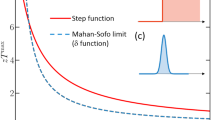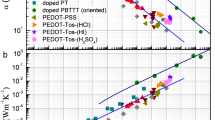Abstract
IT has been proposed1,2 that the Bauschinger effect which occurs in face-centred cubic metals after a plastic strain exceeding 1 per cent might be attributed to the rearrangement of dislocations at the beginning of the reversal of strain. If we rather crudely reckon, that changes of thermoelectric power and electric resistance are measures of the total disorder in a lattice, then these should remain constant during the Bauschinger strain, though increasing during previous and subsequent plastic strain, because during the Bauschinger strain the total disorder in the lattice is not increasing, but merely being re-arranged.
This is a preview of subscription content, access via your institution
Access options
Subscribe to this journal
Receive 51 print issues and online access
$199.00 per year
only $3.90 per issue
Buy this article
- Purchase on Springer Link
- Instant access to full article PDF
Prices may be subject to local taxes which are calculated during checkout
Similar content being viewed by others
References
Woolley, R. L., Phil. Mag., 44, 597 (1953).
Polakowski, N. H., Nature, 168, 838 (1951).
Seitz, F., “Advances in Physics”, 1, 43 (1952).
Author information
Authors and Affiliations
Rights and permissions
About this article
Cite this article
WOOLLEY, R. Thermoelectric Power and the Bauschinger Effect. Nature 174, 566–567 (1954). https://doi.org/10.1038/174566a0
Issue Date:
DOI: https://doi.org/10.1038/174566a0
Comments
By submitting a comment you agree to abide by our Terms and Community Guidelines. If you find something abusive or that does not comply with our terms or guidelines please flag it as inappropriate.



